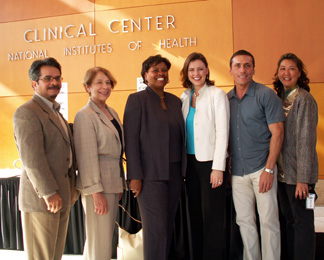 |
Members of the new COPR group including UNMC’s Valda Boyd-Ford, third from left. |
“The NIH wants to make itself better known to the American public,” Ford said. “They want to let the public know what they do and how it benefits them. My role is to serve as the eyes and ears of the public; to get their perspectives and share them with the NIH director.”
Ford’s three-year term runs through 2008. One of seven new members, Ford joins 12 current members of the council, including Sen. Jim Jensen of Nebraska, whose three-year term ends in 2006.
“These new members bring a wealth of knowledge, a clear, public perspective, and professional experience in the areas of public service, health care, medicine, and underserved communities, and the visual media, as well as a strong commitment to the advancement of public health and medical research. I am delighted to welcome them to the Council,” said NIH Director Elias A. Zerhouni, M.D.
By serving as a public voice to the NIH, Ford will bring important matters of public interest to NIH leadership, help increase public participation in the many NIH activities and initiatives that affect the public and increase public understanding of the NIH and its programs.
She is particularly interested in advancing Culturally and Linguistically Appropriate Services (CLAS), a series of standards developed in 2000 by the Office of Minority Health to help eliminate racial and ethnic health disparities. The 14 standards include four mandates, which essentially require health care organizations to have competent interpreters and bilingual staff available, as well as materials and signage in the languages most commonly encountered.
An NIH subcommittee, of which Ford serves on, will suggest ways that NIH-sponsored grant proposals will demonstrate that they follow the CLAS standards and other initiatives designed to guide health care researchers and professionals. “It’s an opportunity to move CLAS to the forefront for our most vulnerable populations,” Ford said. “Researchers can’t just say they will do outreach to a particular group. They also will have to say how they’ll do it and why it will work. Far too many people involved in health care research are unwilling to change their methods of recruiting research participants or are uninformed about the need to develop relationships with minority and underserved communities in order to eliminate the historical fear and lack of trust that now exists in so many areas.”
During her tenure, Ford also hopes to educate communities on the NIH and its programs, thus increasing participating in studies and making the agency more relevant to all Americans. “Ultimately it’s about every person having the opportunity to take advantage of the wonderful programs, projects and people associated with the NIH,” she said.
At UNMC, Ford is responsible for developing community collaborations that address the health of the community, especially the health of the most vulnerable populations. Her work emphasizes eliminating health disparities and promoting community involvement in the health improvement process. She has taught in the School of Nursing at Creighton University and is the president of the Center for Human Diversity, which offers an intensive 10-month course on cultural competency for health care professionals. Nebraska cable television viewers are familiar with Ford as the host and executive producer of “Valda’s Place,” a talk show on health and diversity issues.
Ford is co-chair of the health subcommittee of the Urban League of Nebraska and the Director of Refugee Initiatives for Unite for Sight, an organization dedicated to eradicating preventable blindness and restoring sight throughout the world.
The new COPR members joined the full council for their first meeting on April 28 at the NIH campus in Bethesda, Md. The meeting highlighted such topics as the role of public trust in medical research and clinical trials and how NIH solicits public input into its operations. Most recently COPR members testified before the Institute of Medicine on the issue of having a national clinical trial registry. The full COPR meets again this fall but sub-committee members meet constantly throughout the year – in person or through conference calls.